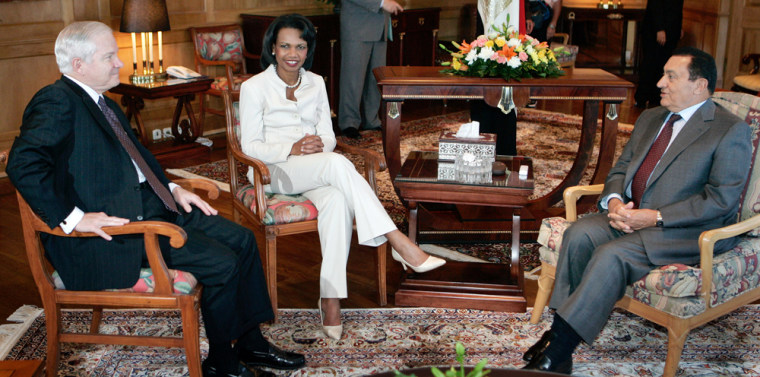The United States won no specific new promises of Arab help for struggling Iraq after a gathering Tuesday of several nations listed as recipients of an expanded aid and weapons package for friendly states in the region.
Iraq’s Arab neighbors repeated a general pledge to promote stability in Iraq, torn by more than four years of war and bitter sectarian divisions that have killed thousands and driven far more from their homes.
“I think we know what the obligations of the neighbors are,” Secretary of State Condoleezza Rice said, adding that Egypt and other U.S. allies are working to meet past promises of relief of Iraq’s heavy international debt, additional foreign aid and help tamping down violence inside Iraq.
Rice and Defense Secretary Robert Gates are making a rare joint show of diplomatic force during two days of meetings with Arab allies — part of an 11th-hour effort to rally diplomatic and practical help for the U.S.-backed Shiite-led government in Baghdad. The tour also opens talks on a proposed U.S. arms package for Arab states worth more than $20 billion.
But at a press conference with her Egyptian host, Rice pointed to no fresh commitments from the Arabs. A statement issued following a nine-nation meeting promised only “to continue to support Iraq and expand their financial and political support,” and restated a general commitment to blocking would-be terrorists and financing that supports them from entering Iraq.
“The ... commitment was always to help a united Iraq to reach that point of full stability, and that we have been trying to do over the last four years,” Egyptian Foreign Minister Ahmed Aboul Gheit said following the joint meeting.
Not an easy sell
President Bush’s top diplomatic and military managers have a tough assignment to convince skeptical, mostly Sunni-led Arab nations that they have more to lose if Iraq fails than they stand to gain by waiting until the U.S. leaves or Bush’s term ends.
The Cabinet secretaries are also trying to solidify what the U.S. sees as a bulwark of generally moderate Arab states against an increasingly ambitious and unpredictable Iran.
“We have also been calling for the noninterference of any foreign powers into Iraq,” Aboul Gheit said. “That is something we would renew.”
Unity against Iran is not a hard sell. But Washington has had far less success in rallying Arab help for Iraq that goes much beyond words.
Arab money and diplomatic support has lagged behind Europe’s, and some of Iraq’s neighbors quietly tolerate, or may secretly support, attacks inside Iraq. Some of the violence targets U.S. forces and some of it Shiite militias and neighborhoods.
For their part, Arab countries may be worried that escalating opposition in the United States to the war in Iraq may signal a declining commitment to security in the region.
Bush announces arms package
Hours before Rice and Gates embarked on their diplomatic mission, the Bush administration announced Monday a proposed U.S. arms package to Arab nations worth more than $20 billion. The sophisticated weaponry, according to U.S. officials, would strengthen relatively moderate Persian Gulf regimes against extremist regimes and ideologies, chief among them Iran.
Rice said the arms deal, along with an aid package for Israel and Egypt, was not a trade-off for assistance.
As he flew to the region, Gates told reporters that he wanted to assure allies that the United States will continue to have a strong military presence in the region. Although a buildup in U.S. forces has raised the number of troops in Iraq to nearly 160,000, pressure is mounting in the U.S. for redeploying troops if the political and security situation there doesn’t improve by fall.
U.S. officials want “to reassure all of the countries that the policies that the president pursues in Iraq have had and will continue to have regional stability and security as a very high priority,” Gates said.
U.S. officials also hope to tamp down any worries among Arab countries that the heated debate and escalating opposition within the United States over the war in Iraq signals a declining U.S. commitment to security the Middle East.
